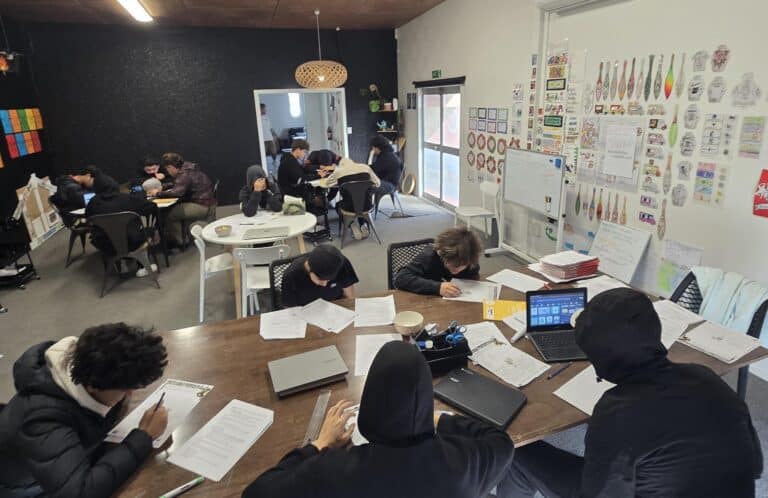Every weekday morning at Awhi Charitable Trust begins the same way: toast and Milo. Ākonga settle into a comfortable room, full of sofas, games, pens and pencils, photos and cosy throws to wrap over their knees.
Awhi, based in Hastings has been running since 2021, set up by co-founders who identified a need for more options suited to rangatahi falling through the cracks of mainstream education.
What does “falling through the cracks” even mean? Well, it’s truancy – some of the kids at Awhi have never attended school with any regularity. They’re disengaged, uninspired, and their needs totally unmet by the current education system. “And it’s usually through no fault of their own,” begins co-founder/Operations Manager Vicki Welsby. “These are kids coping with a combination of factors that might include trauma, poverty, neurodivergence, transience, and an inflexible education model. We tell our whānau this all the time — you haven’t failed the system. The education system has failed you.”
Coming from backgrounds in community education, Vicki and her co-founder and friend Ben Brodie started Awhi Charitable Trust in 2021 with an initiative for 13-16 year olds who would come via Alternative Education, an output of the Ministry of Education. The senior programme is now supported by a junior programme: a small, completely community-funded programme for 9 to 12-year-olds. Limited to just 10 children, Vicki says much of what’s learnt is around the concept of belonging.
“We’re not teachers, but we know how to create a safe, welcoming environment. We start with relationships. If the child feels safe, then learning can happen.”
And it’s really about the basics, to begin with. Awhi gives its juniors structure and routine. The kids understand that they’ll be collected each morning from home by van and brought to the Awhi space in central Hastings. After toast and Milo, it’s a chat about the day, morning mahi, maybe a game of table tennis or basketball, lunch, and then piling into the three Awhi vans to get outside – perhaps to the river, the beach, or the Sports Park – and burn off some energy. “These are those fundamental building blocks of education that don’t even include formalised reading and writing,” explains Vicki. “We teach lessons that centre around being with each other, following an instruction, getting along with our peers.
“It’s really beautiful to see our successes because often, these are children living tough lives. For them, at a regular school, it’s easier to be angry than it is to describe what they are struggling with. And now, they’re at the park with a stick playing sword fights or kicking a soccer ball, being children.”
Today, Awhi has an Alternative Education contract for the senior programme (13 to 16-year-olds), many of whom then transition into vocational training or employment.
But the trust is 100% reliant on community funding to operate the junior programme. Grants from the likes of Hawke’s Bay Foundation are essential.
The Foundation has supported Awhi’s programmes for three years – that’s three years of local children having somewhere to go, to fit in, and to learn. “If that funding stopped, we’d be back to square one. And for some of these kids, that means sitting at home, excluded from school, and isolated. In Aotearoa, we just don’t have options for our very young children. We simply think that under-13s who are not at school don’t exist when actually, it’s our most in-demand cohort. Some haven’t been in school for multiple years. And they’re nine years old.”
Awhi is low on rules and big on kindness. The only boundary? No violence and no bullying. “This is a safe space for everyone, and if we can’t keep others safe, then that’s when we’ll question whether we’re the right fit for a child.’”
Vicki – one of a team of six staff – knows the programme is working when she sees the impact on both the student, and the wider whānau.
It can be profound, she says. “Parents who’ve fought to get their child out the door now watch them happy to head off to the van, excited for the day. Caregivers get some respite. And you see a shift in the pattern of the whānau, because if there’s been an older sibling who is just not going anywhere every day, that is a message to the younger siblings. Once you break that, the family can really change. They know ‘We’re a whānau that goes to school now.’”
There’s so much more Awhi wants to do – a bigger property that includes outdoor space, more opportunities for their rangatahi, employment of a specialised educator, and additional programmes that would accommodate younger tamariki. It’s community funding from generous funders, through the likes of Hawke’s Bay Foundation, that will help make it happen.
“We’re preparing for growth, because we’re hearing of kids getting kicked out of school aged six or seven. Some are being excluded from kindergarten,” says Vicki.
“These are kids who don’t deserve less – they deserve to be accessing everything they need and want. They really are the most awesome kids and it’s amazing to be in the position where we get to hang out with them every day.”

